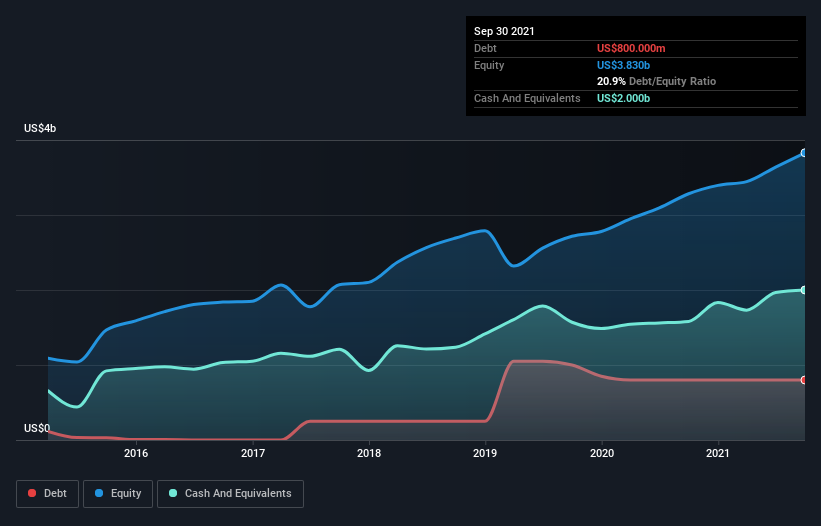Is United Therapeutics (NASDAQ:UTHR) A Risky Investment?
David Iben put it well when he said, 'Volatility is not a risk we care about. What we care about is avoiding the permanent loss of capital.' So it might be obvious that you need to consider debt, when you think about how risky any given stock is, because too much debt can sink a company. We can see that United Therapeutics Corporation (NASDAQ:UTHR) does use debt in its business. But the real question is whether this debt is making the company risky.
Why Does Debt Bring Risk?
Debt and other liabilities become risky for a business when it cannot easily fulfill those obligations, either with free cash flow or by raising capital at an attractive price. Part and parcel of capitalism is the process of 'creative destruction' where failed businesses are mercilessly liquidated by their bankers. While that is not too common, we often do see indebted companies permanently diluting shareholders because lenders force them to raise capital at a distressed price. Of course, the upside of debt is that it often represents cheap capital, especially when it replaces dilution in a company with the ability to reinvest at high rates of return. The first thing to do when considering how much debt a business uses is to look at its cash and debt together.
See our latest analysis for United Therapeutics
What Is United Therapeutics's Debt?
As you can see below, United Therapeutics had US$800.0m of debt, at September 2021, which is about the same as the year before. You can click the chart for greater detail. However, it does have US$2.00b in cash offsetting this, leading to net cash of US$1.20b.
A Look At United Therapeutics' Liabilities
The latest balance sheet data shows that United Therapeutics had liabilities of US$320.0m due within a year, and liabilities of US$899.2m falling due after that. Offsetting this, it had US$2.00b in cash and US$212.8m in receivables that were due within 12 months. So it actually has US$994.0m more liquid assets than total liabilities.
This surplus suggests that United Therapeutics has a conservative balance sheet, and could probably eliminate its debt without much difficulty. Simply put, the fact that United Therapeutics has more cash than debt is arguably a good indication that it can manage its debt safely.
On the other hand, United Therapeutics saw its EBIT drop by 3.9% in the last twelve months. That sort of decline, if sustained, will obviously make debt harder to handle. The balance sheet is clearly the area to focus on when you are analysing debt. But it is future earnings, more than anything, that will determine United Therapeutics's ability to maintain a healthy balance sheet going forward. So if you're focused on the future you can check out this free report showing analyst profit forecasts.
Finally, while the tax-man may adore accounting profits, lenders only accept cold hard cash. United Therapeutics may have net cash on the balance sheet, but it is still interesting to look at how well the business converts its earnings before interest and tax (EBIT) to free cash flow, because that will influence both its need for, and its capacity to manage debt. During the last two years, United Therapeutics generated free cash flow amounting to a very robust 98% of its EBIT, more than we'd expect. That puts it in a very strong position to pay down debt.
Summing up
While it is always sensible to investigate a company's debt, in this case United Therapeutics has US$1.20b in net cash and a decent-looking balance sheet. The cherry on top was that in converted 98% of that EBIT to free cash flow, bringing in US$487m. So we don't think United Therapeutics's use of debt is risky. There's no doubt that we learn most about debt from the balance sheet. But ultimately, every company can contain risks that exist outside of the balance sheet. To that end, you should be aware of the 1 warning sign we've spotted with United Therapeutics .
At the end of the day, it's often better to focus on companies that are free from net debt. You can access our special list of such companies (all with a track record of profit growth). It's free.
Have feedback on this article? Concerned about the content? Get in touch with us directly. Alternatively, email editorial-team (at) simplywallst.com.
This article by Simply Wall St is general in nature. We provide commentary based on historical data and analyst forecasts only using an unbiased methodology and our articles are not intended to be financial advice. It does not constitute a recommendation to buy or sell any stock, and does not take account of your objectives, or your financial situation. We aim to bring you long-term focused analysis driven by fundamental data. Note that our analysis may not factor in the latest price-sensitive company announcements or qualitative material. Simply Wall St has no position in any stocks mentioned.

 Yahoo Finance
Yahoo Finance 
